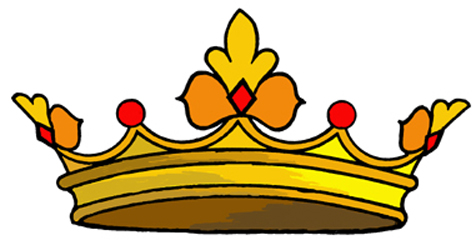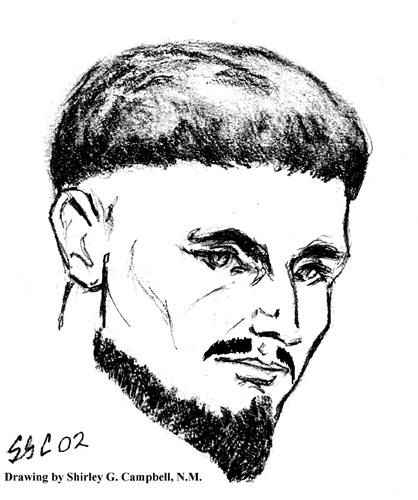
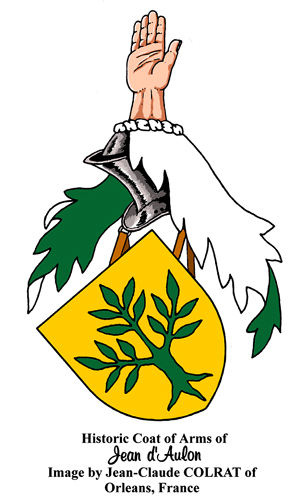


Jean d'Aulon, Part VIII
CHAPTER 15
THE BATTLE FOR THE TOURELLES
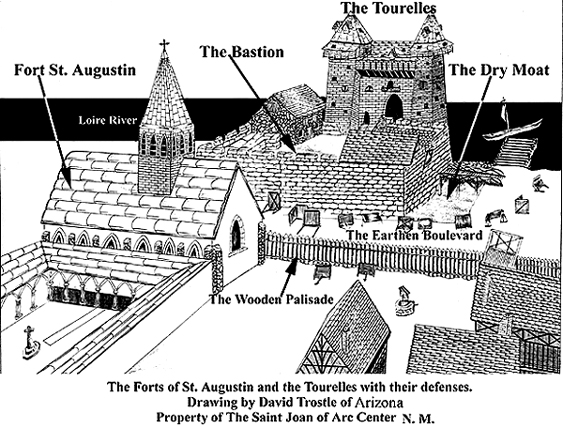

I will describe in detail the Tourelles' defenses, so that our children and their children's children will know what trials we had to endure to free Orleans from the hated English.
Between the Augustin and the main tower of the Tourelles was a series of seven defenses. The first was a wooden wall made of tree trunks called a palisade. This wall was ten feet high and had only one gate/drawbridge that allowed entry into the interior of the fort's defenses.
The second defense was an earthen ditch, ten feet wide and twenty feet deep, which separated the palisade from the earthen boulevard! When the gate/drawbridge of the palisade was lowered, it extended over this gap. The builders intentionally made the walls of this dry ditch soft so that the men would slip and slide as they attempted to climb.
The third defense was the flat top of this earthen wall called the boulevard. It was twenty-five feet wide and surrounded the bastion on three sides. From this advantage point the English would hurl their weapons at us. A permanent twenty-foot long wooden bridge extended out from the end of the boulevard's right side while the bastion's fifteen feet long drawbridge connected with it. Thus when these two wooden structures were joined, this bridge linked the boulevard with the bastion.
The fourth defense was the large dry moat that measured twenty feet deep by thirty-five feet wide. Stone blocks lined the descending wall of the dry moat at an angle of eighty degrees. This forced us to use scaling ladders to descend the steep angle, thus slowing our advance. On the other side of the dry moat the army came to the beginning of the fifth defense called the bastion. This was the outer stone fortification of the Tourelles. Built up from compacted earth and stabilized by stone, the bastion's wall was some forty feet high. Once over this wall, we faced the sixth defense, the bastion's courtyard.
This courtyard measured one hundred feet square. The seventh and last defense was found on the opposite side of the courtyard, which was a twenty-five foot wide, water-filled moat. The water that flowed through the moat came from the Loire. A drawbridge connected the bastion's courtyard with the Tourelles.
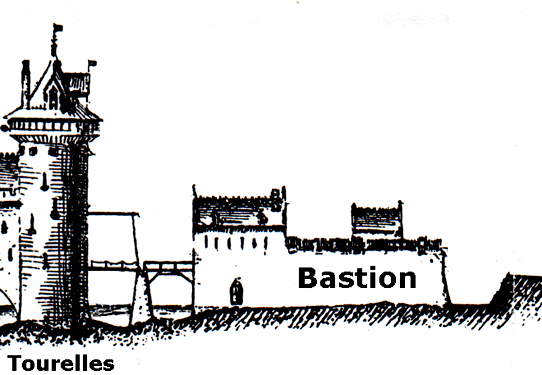
Difficult as this obstacle course was for the French army to overcome without any additional hindrance, we had to contend with eight hundred Englishmen fighting for their lives. These defenders threw down upon us a shower of arrows, crossbow bolts, large stones, axes, pikes and hot pitch. You can see the difficulty our forces faced in taking this position from the English.
The only way for our army to overcome the enemy's fifth defense, the bastion's lofty walls, was to use scaling ladders. At best the standard scaling ladder was narrow, flimsy and insubstantial. Usually the ladder made a sixty-degree angle when placed against the wall. If the man did make it to the top, he was beaten back with blows from clubs and battle-axes. The English also used long poles to push the ladder away from the wall, causing both the unfortunate climbers and the ladder to go crashing to the ground. We were like ants going up these ladders. When one man fell, the next man took his place.
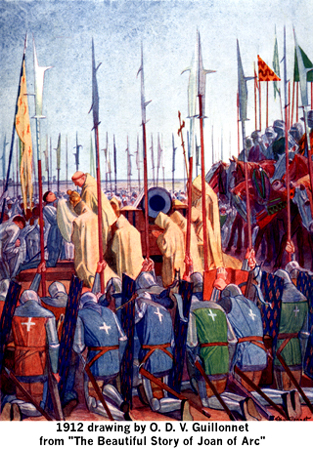
Early in the morning of Saturday May 7th, even before the sun had risen, twenty priests were already hearing the men's confessions as Jeanne tearfully confessed before Father Pasquerel. Then using a portable altar Father Pasquerel said Mass for us in the field. With the men spiritually prepared to meet God, and all stood in readiness, The Maid addressed her troops.
"Do not fear this day or what it brings, for one day we will be together in the Kingdom of Heaven. I love you all as Christ loves you. Together with Jesus, we shall witness a great victory, for it comes from Jesus!
I beg you to be kind to the injured and the dying, as God has been kind to you. It is by your merciful actions that Christ's Kingdom will be restored to France. And when, at the end of this day, victory comes, I beg you not to celebrate it selfishly but instead celebrate with honor; an honor that brings glory to the King of Heaven."
The soldiers' thunderous cheers soared in response to her encouraging words.
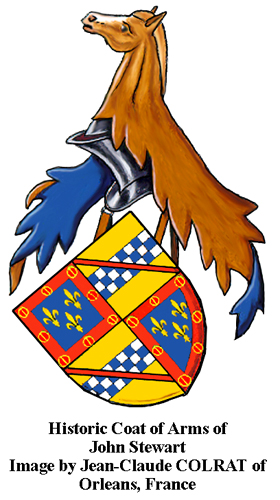
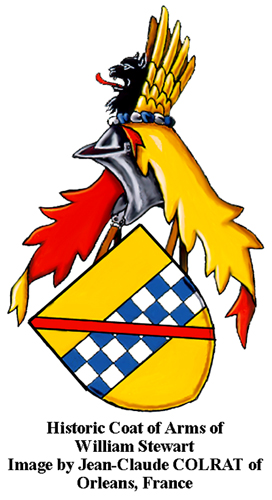
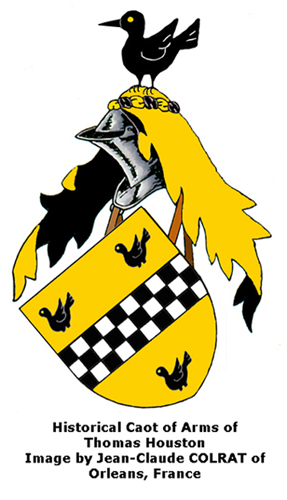
To honor their Masters who had fallen during the 'Battle of the Herrings', John Stewart's and Sir William's pipers began to play a mournful tune. Soon the pipers from each of the other Scottish contingents joined in. Such a heart-wrenching sound moved me to the very depths of my soul. Almost as quickly as the lament began, it was replaced by a robust battle march. It is hard to describe the POWER that bagpipes have to move the hearts and minds of fighting men. If you have not heard a piper weave his craft, you will not understand of what I speak. But for us, the fortunate few, there is nothing more powerful than this simple musical instrument to stir and steel the hearts of even the most cowardly of men!
The intrepid Commander Sir Thomas Houston, shouted at the top of his lungs: "Come on, brave Scots, be ye low born or high, grasp ye weapons and let us fall upon these miserable Godons! For God and Saint Andrew - VICTORY!"
Upon hearing him speak in his strange language, I thought, "Mon Dieu! My blood burns, as that of any Scotsmen here!"
With this, Jeanne swiftly raised her sword up high as a signal for our trumpeters to sound the notes that would begin the attack.
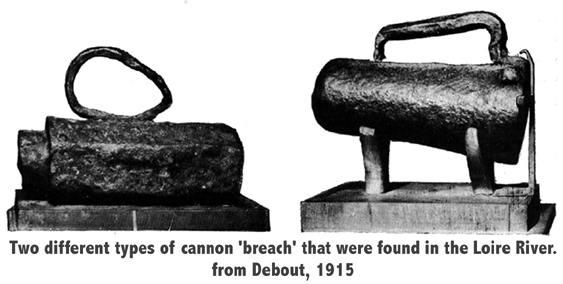
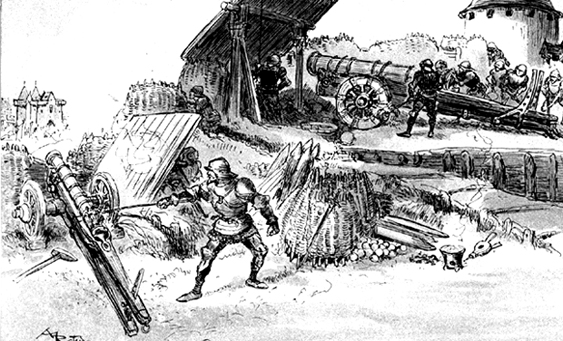
The first objective was to break down the wooden palisade. We accomplished this by shattering the wall with a bombardment from our cannons. Next we struggled to fill in the earthen ditch with bundles of sticks that were bound together called a faggot. The soldiers worked resolutely, taking little or no heed of the missiles that the English flung at them. One by one each man threw his load of wood into the deep ditch.
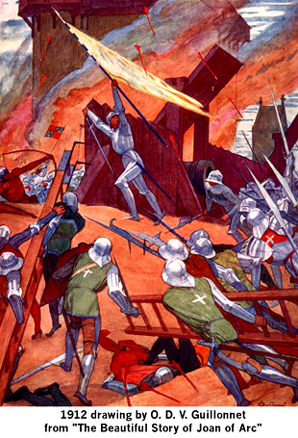
Although Jeanne never actually used a weapon to kill or wound anyone, she nonetheless easily blocked and parried all blows that were directed toward her. Always in the thickest part of the battle, she excelled in the effective placement and direction of her troops. Constantly in motion, Jeanne's presence among the men was ever an encouragement, whether she was cheering us on or helping to move the wounded out of danger.
The work went slowly. By noon though, our troops had captured the boulevard! Thus we began the second phase of the attack. Some of the men descended the wall into the dry moat with the use of the scaling ladders. Others tried to run down its steep slope but most of them lost their footing. When that happened, they found themselves tumbling down at great speed, until they crashed, disorientated and bruised, onto the floor of the moat.
Once on the floor of the dry moat, the scaling ladders were brought forward and propped against the bastion's wall. Repeatedly, the men tried scaling the flimsy ladders only to be beaten and hammered back by our foes. The fighting at the top of the seemingly impregnable fortifications was brutal because the English fought with such ferocity! The air was thick with arrows, bolts, stones and missiles of every sort. The earth shook and the air thundered with each shot of the great cannons. The drifting smoke from these cannons choked our throats and stung our eyes.
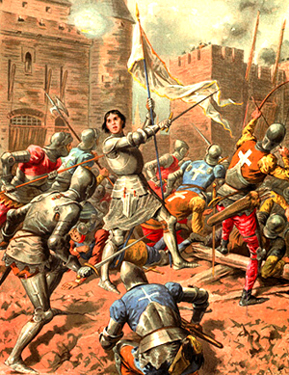
Jeanne, this girl, this mystical figure in white armor, was ever encouraging her soldiers and never shirked from lending a hand with the hard work. Wherever she went, her pennon was continuously before her, held by her faithful page, Louis. We had fought from dawn to the late afternoon. In spite of all Jeanne's hard work, our disappointment and frustration grew with each failure to capture the bastion. Jeanne could tell that her beloved warriors were becoming discouraged. So she spoke for all to hear, "Have good heart! Do not fall back! You will soon have the bastion! Sound the charge!"
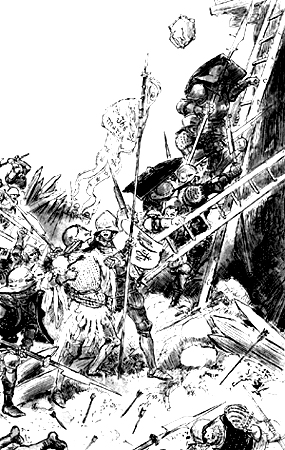
Again, the trumpets sounded the notes of attack. A hearty cheer rose up from the men as they went to their work. Jeanne placed a scaling ladder against the bastion wall, her face before the enemy. As she placed her foot upon the ladder, an arrow from an English Longbow pierced her armor penetrating above her right breast. The force from the blow was so great that it caused her to spin around in the air as she went crashing backward to the ground! With a great thud she hit the soil, sending up a cloud of dust from around her limp bleeding body.
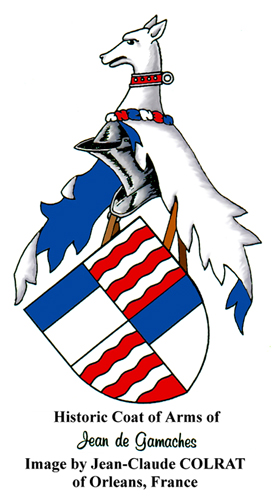
Sir Jean de Gamaches was next to her when she fell. He helped her up from the ground as he gallantly tried to comfort her. "I am sorry for the way I spoke about you. I must admit that I was wrong when I called you a 'gueuse,' for I have never seen any captain braver than you!"
Through her tears of severe pain and gritted teeth Jeanne replied, "I do not hold a grudge against you, sir. You spoke, as you believed. You are truly a most brave and noble knight." Their eyes locked for a moment, then he turned away.
Within seconds Mortain, La Hire, Bertrand and I came to Jeanne's aid. Using our bodies as a shield, we carried her back behind the main lines where we gently laid her down upon the ground.
Jeanne was so frightened because she had never felt such pain. It took her a few minutes to regain her sense of reality, but once she did, she was as brave as ever and the captains around her acknowledged this among themselves.
Louis carefully slid her breastplate off from around the arrow's shaft. It was then that I perceived the seriousness of her wound. With its point extending six inches out from her back, almost half of the arrow's length had penetrated through her body!
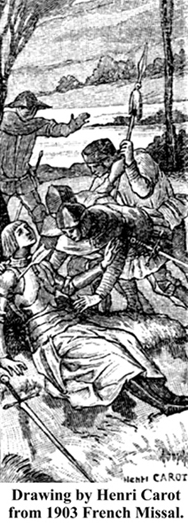
Jeanne, faint and trembling, continued to cry from her pain as I cut the arrowhead from the shaft. Father Pasquerel, close by her side, hoarsely whispered words of encouragement as he prayed for her healing. While my eyes searched her frightened and pain racked face, I suddenly realized that her countenance was changing!
I saw her eyes widen; and in that fleeting moment I realized that her vision had engulfed me. I had become invisible to her. Not only I, but also all those around me had become less than a speck of dust floating in the air, too minute even to notice! I knew, somehow, that she beheld... the glory of heaven!
The boundless love that reflected from her face was disturbing and wonderful, frightening and awesome all at the same time. Now I knew why the Israelites had Moses wear a veil over his face for the beauty that shone from it was too much for them to bear. An instant more, I heard Jeanne say, "I have been comforted."
The sight of Jeanne, with her own hand, yanking the arrow's shaft out of her body, forced me back to reality. Horrified by the torrent of blood that came with the arrow, I tried to stem the crimson tide with my hand but I could not! I looked around asking if the others could do something to stop this gushing wound but they only shook their heads 'no.' I tried not to let Jeanne see my distress, but inwardly I became frightened that she might bleed to death!
During this time of confusion and uncertainty, a crusty old foot soldier came over to Jeanne. Dangling from his extended hand was some sort of charm. He offered in all friendship to sing an ancient chant over her wound that was sure to stop the flow of blood. In my desperation I began to nod in acceptance, but Jeanne refused shaking her head. "No friend, I cannot. I would rather die than do a thing, which I know to be a sin. I know well that I must die one day, but I do not know when nor in what manner, nor on what day. If my wound can be healed without sin, then I will be glad to be cured."
She told us that God would heal her if we would all pray for her. What a sight to see, hardened warrior captains with tears in their eyes knelt by her side and prayed for her as she had prayed for them.
The Lord must have inspired me because suddenly I knew what to do! I quickly packed the gaping hole in her chest and back with a large amount of bacon lard. After this I applied a heavy bandage soaked in wine to the wound. Then I pressed on it with my hands until the flow of blood eased up. Finally I was then able to tie the bandage on with a long cloth.
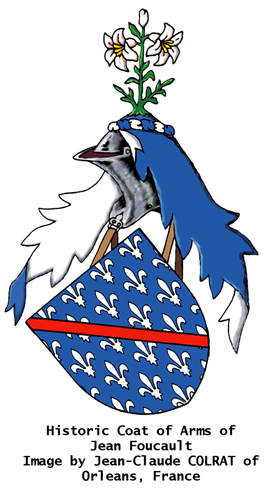
Jeanne was as white as her standard as she tearfully confessed to Father Pasquerel. As Father gave her absolution, I saw her chest heave with a deep sight of relief; she was able to rest.
Jeanne soon slept I hovered over her like a mother hen. As I kept watch, I had time to think about my gallant Maid. Her wound, I thought, made her a true soldier who was willing to die for both God and France. Later, many days after the relief of the city was accomplished, I realized that her wound, or should I say the shedding of her blood, was the true beginning of her victory at Orleans.
Rumors began to fly like wildfire throughout the Army. Small fights broke out among her troops as some men said that God did not send Jeanne because He would not have allowed her to be wounded or killed. Since her coming, never were the troops as discouraged as they were then.
Meanwhile the attack continued, but her warriors did not feel as invincible without her cheering them on. It was getting late, near sunset, and the army made no further progress in the assault. Count Jean felt it was hopeless to attempt another assault on the bastion that day, so he ordered the trumpeters to sound the notes for retreat.
Hearing the sound Jeanne awoke with a start. A soldier told her that they were afraid to continue the battle without her.
Jeanne heard and was horrified! She realized that if they retreated, they would be giving up all the hard won ground they had captured so far and more lives would have to be sacrificed just to regain the same defenses. This thought revolted her so much that even though she was still in great pain she forced herself up saying, "We will fight". She was in no condition to move never mind lead a battle, but using every bit of her remaining strength, Jeanne, with my help, to put her armor back on. She then rushed to the Bastard's side. "In God's name, courage! You will go soon go into the fort! It is for the King of Heaven that we fight! This day will bring you Victory!"
The captains, tired and frustrated, emphatically shook their heads in protest. "It's already 9 o'clock and it will soon be dark. It is too late to make another assault."
Jeanne would hear none of it and remained as firm in her decision as the walls of the Tourelles. Despite her serious wound, she remained firm. "Be not afraid! The English will have no more power over you." The captains were still unsure. "Order the men to take some rest and have them eat and drink a little. After that, with the grace of God, return to the assault for, without fail, the English will have no more strength to defend themselves and the bastion and fort will be taken. I will go over to that nearby vineyard and pray." Jeanne then mounted her horse and before she left, she gave me her standard to hold. When she reached the vineyard, she dismounted and knelt to pray. As Jeanne was praying, I thought to myself, if only the men could see her standard near the bastion's wall, the army would take heart again and return to the fight. I asked my friend, the Basque, to accompany me and he agreed. I gave him the standard before I went down into the dry moat.
At that very moment, Jeanne returned to see her beloved standard in the hands of an unknown man who was disappearing into the dry moat. Running over to her standard she grabbed it by its tail end. Not bothering to look to see who was tugging on the end of the battle standard, the Basque pulled on it. This caused a tug of war to ensue as she frantically yanked on it. "Ah, my standard, my standard!" With one mighty pull he wrenched it from Jeanne's weakened hand and followed me into the dry moat. By this time the whole company was around her.
"Watch!" she said to de Gamache. "When you see the wind drive my banner toward the fort, it will be yours!" A few minutes passed when he yelled, "Jeanne, your standard touches the wall!" This was the sign her Voices had promised! Jeanne, renewed in her strength by her Voices, shouted, "Then enter boldly! All is yours!"
She jumped onto the descending wall of the dry moat and slid down it! She sprang from the wall at a full run quickly catching up to the Basque and me. Taking her pennon from Louis, who was always close by her side, she rushed to the walls of the bastion. Swiftly she climbed the scaling ladder. In what seemed like only a heartbeat she raced to the top of the bastion.
The bewildered English could only stand by and stare at her! Before this point the battle of Orleans was all but lost, but in this electrifying instant the reverse was true! Upon seeing Jeanne leading the charge, the English were so filled with terror at the sight that they hesitated in their defense. Had they not just seen her, a mere two hours before, lying in a pool of her own blood being carried off the field? Yet here she was attacking them again! They thought that God had raised her from the dead and they questioned their own faith. Many of them were afraid to raise their swords against Jeanne or any of her forces. Some even believed that God had taken their will to fight from them.
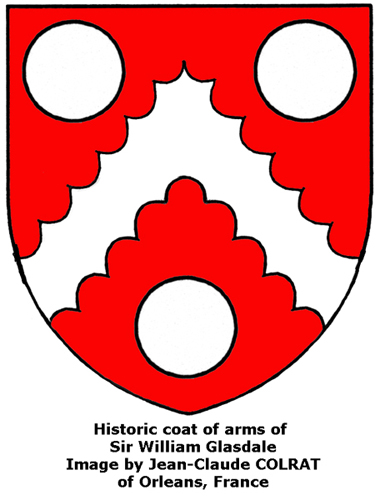
Jeanne waved her pennon back and forth as she shouted to her men, "In! In! The place is yours!" Like a swarm of angry bees, the French army surged forward and scaled the bastion with ease. Regaining their senses, the English high command ordered a slow, orderly retreat back into the Tourelles. The English officers stayed behind to slow our advance, which gave time for their forces to enter the Tourelles' main fort.
Jeanne caught sight of Glasdale and yelled in her native tongue, "Classidas! Classidas! Yield; yield to the King of Heaven! You called me harlot, but I have great pity on your soul and for the souls of your men." Glasdale and the rest of the English command ignored Jeanne's words and refused to surrender.
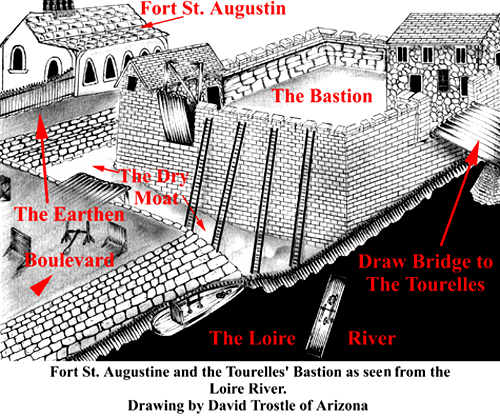
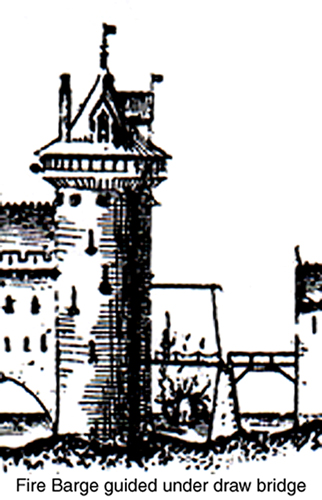
Meanwhile an unknown group of men from Orleans managed to float a large barge down the Loire and into the moat. It was loaded with all sorts of flammable items. Placing this barge under the drawbridge that connected the courtyard with the Tourelles, they set it afire. With the support beams of the drawbridge weakened by the blaze, the structure was unable to carry the combined weight of Glasdale and his forty fellow officers. The drawbridge gave way and the men fell into the water. The weight of their armor dragged them under and they all drowned. Jeanne fell to her knees as she cried openly for the souls of those who had so cruelly met their death. Even as Jeanne cried, we continued to press the attack.
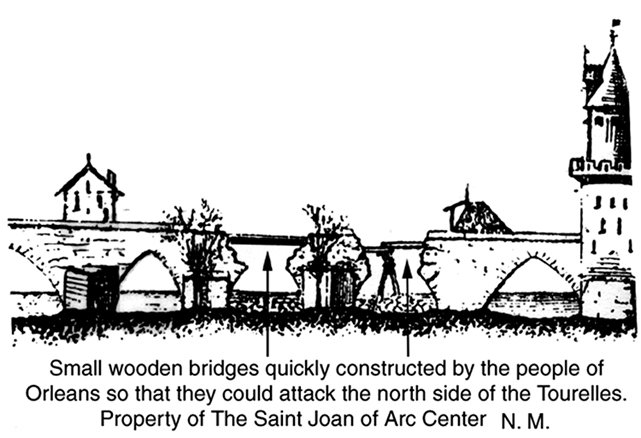
While we were attacking the front defenses of the Tourelles, the people from Orleans built a small shaky wooden structure, which connected the two portions of the stone bridge. Courageously they crossed this makeshift bridge to attack the English. With a terrible vengeance the citizens of Orleans fought hand to hand, and soon the English within the Tourelles were overrun and slaughtered. Jeanne and her men could not enter until the fire from the barge and drawbridge had ceased burning. By that time, she was only able to save the last two hundred Englishmen from being massacred.
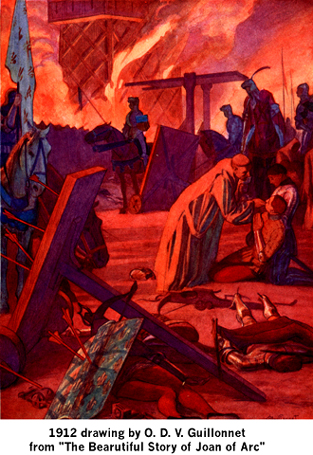
When the battle was won, Jeanne, as usual, was very kind to the wounded English. She asked her soldiers and captains to show mercy to those who were injured and that they should pray for those who died.
Her captains, still not comfortable with her benevolence towards the enemy, grudgingly came to accept it. At least no one would openly complain about it to her face.
Even though Jeanne was still in great pain from her own brush with death, she nonetheless placed the well being of the afflicted English and French soldiers above her own suffering. The people of Orleans and the men of her army were amazed by this and they all said she was truly an Angel of God.
Jeanne asked Father Jean and the rest of the priests to help all the injured, English and well as the French soldiers, which they willingly did.
She prayed and held in her arms friend and foe alike, whose wounds would soon bring them to death's door. With great care Jeanne comforted many, as their souls were leaving this world. She told them that she would one day be with them and she would rejoice at seeing their faces once more in the Kingdom of Heaven.
As Jeanne had predicted, that night the victorious French army marched into Orleans by way of the bridge! The streets were ablaze with torchlight as the people laughed, cheered and cried for joy all at the same time. All the bells of Orleans rang out with the joyous news. We are free! We are free! Then, suddenly, everyone in the town began to sing, "Te Deum Laudamus," as they celebrated the miraculous victory!
I took Jeanne back to the Boucher's residence. The whole family accompanied us to her room. They quickly helped me to remove Jeanne's entire armor. Then we eased her into a chair. Agnes was gently removing Jeanne's arming doublet when the old surgeon arrived. His two assistants carried a large iron pot filled with red-hot coals between them. Shoved into these blazing coals were long thin metal rods that glowed almost as red as the embers themselves. "I am going to have to cauterize your wound, Maid," the surgeon said.
Except for the bandage that I had applied, poor Jeanne was naked from the waist up. She was embarrassed by this and blushed a brilliant crimson. Agnes noticed Jeanne's distress and draped an apron over her. In silent thanks, Jeanne flashed her a grateful glance. The two assistants strapped wide, thick leather bonds around her to the arms of the chair. A half an inch thick scrap of leather was placed into her mouth for Jeanne to bite down on. Little Charlotte was asked to leave but she refused. Instead she ran to Jeanne's side where she knelt down and took hold of Jeanne's left hand. Charlotte then pressed her forehead onto Jeanne's fingers and in this way she shielded her eyes from the gruesome sight that was about to occur.
As the surgeon approached Jeanne with the glowing iron, his assistant removed the dirty bandage. In terror Jeanne grimaced as she clamped her teeth upon the leather strip. As the red-hot iron came closer to her flesh, Jeanne's body stiffened and her chest began to heave. Her knuckles whitened as she grabbed the wooden arms of her chair. Just as the hot iron was about to touch her tender flesh, she quickly turned her head and tightly closed her eyes.
Now that the bandage had been removed, the surgeon took a moment to wipe the lard and blood from Jeanne's skin so that he could inspect the wound more closely. Instantly, an amazed look came over him as he placed the red-hot rod back into the iron pot. Surprised by his reaction we stared at each other.
"It is a miracle! It's a miracle!" he said crossing himself. "In all my years of being a surgeon and dealing with battle wounds as serious as this one appeared to be, I have never seen anything like it!" He turned to me and asked, "This wound is but a few hours old, is that not so?" In astonishment I nodded 'yes.' "I don't need to cauterize her wound; the Lord did it for me!" He then ordered his assistants, "Remove the Maid from the restraints!" After which he applied some kind of thick herbal ointment to the wound and dressed it in fresh linen bandage.
The surgeon and his assistants left, astonished by this apparent miracle. Agnes and Charlotte quickly helped Jeanne to put on a soft shirt. Then Jeanne ate her first meal of the day: five pieces of toast soaked in water reddened with a little wine. Jacques, Agnes, Charlotte, Maurice and Madeline with baby in arm crowded around her. Overwhelmed with joy, they too trembled as they celebrated the victory and Jeanne's healing. Little Charlotte burst into a torrent of tears as she buried her face in Jeanne's lap. Jeanne smiled at her as she stroked her hair. "Why are you crying, Charlotte?"
She looked up; her face was red and stained with tears. "You had been hurt, Jeannette! You could have been killed! I don't know what I would have done if you had died."
Though exhausted, in pain, and hoarse from all the shouting she had done throughout the day, Jeanne's only thought was for this frightened little girl. She tried to soothe her tiny friend with gentle words and caresses. "Charlotte, I would have sacrificed all, even my very life, for you and for all the people of Orleans in order that you would no longer have to live in fear. I would have gladly given my life so that you could be free to live in God's peace and justice, as all people should be free to do."
